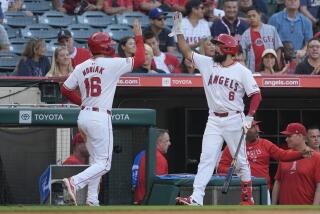Watson Says Draftees Need to Play
- Share via
The Detroit Tigers and No. 1 pick Matt Anderson are haggling over a few hundred thousand dollars more than the team’s $2.505-million offer, the Angels and No. 3 pick Troy Glaus still haven’t come to terms, and some big leaguers are wondering: What’s going on around here?
“What’s the difference between $2.3 million and $2.5 million?” Angel pitcher Allen Watson said. “The key is you want to start playing. These guys are worried about an extra $100,000 or $200,000, but all the money is in the big leagues. They’re losing out by not playing the whole summer.”
Watson was a first-round pick (21st overall) of the St. Louis Cardinals in 1991 from New York Tech and signed for $225,000 within 10 days of the draft. Within three years he had reached the major leagues.
“Basketball and football are different--you go right into the pros from college,” Watson said. “Being a first-round pick in baseball doesn’t mean you’re going to make it to the big leagues, so you don’t want to be greedy or create bad blood in the organization.”
Anderson is a relief pitcher from Rice University, where the fall semester began this week, but the right-hander has not yet attended class. Once he walks into a classroom, the Tigers would forfeit their rights to sign him.
Classes don’t begin at UCLA until Sept. 25, so the Angels aren’t right up against a deadline with Glaus, but Glaus appears to be waiting for Anderson to sign before making a decision.
Further delaying negotiations was the St. Louis Cardinals’ recent signing of high school pitcher Richard Ankiel, the 72nd pick who received $2.5 million. Doug DeCinces, advisor for Glaus, said the Ankiel signing would have an “immediate” impact on Angel negotiations.
“It’s not just the kids, it’s the agents,” Watson said. “They’re telling kids they should hold out because they can get more. You hear that a lot. Then again, it’s not all their fault. Everyone else is getting the money, so they want it for their guys.”
*
There was a sliver of good news in the Angels’ 6-1 loss to Detroit Friday night. Reliever Rich DeLucia, who thought his season was over when doctors discovered an aneurysm in his right shoulder in July, pitched 1 1/3 innings, his first appearance since July 14.
DeLucia replaced starter Dennis Springer with two on in the seventh and struck out Travis Fryman to end the inning and gave up a walk and Deivi Cruz’s RBI double in the eighth, but DeLucia, who underwent surgery in July, said it was still “refreshing” to be back on the mound.
“I wasn’t throwing as hard as I usually do, but my arm felt strong,” DeLucia said. “It will come back. It’s like going out for your first spring training game. You know you’re going to gain velocity over the course of the spring.”
*
Jason Dickson has not exactly responded to the pressure of a division race--the rookie right-hander has lost his last two starts, giving up 11 earned runs and 15 hits, including three home runs, in 7 2/3 innings.
Dickson has had occasional shoulder and elbow stiffness since the All-Star break, but Manager Terry Collins believes Dickson’s problems are not physical.
“He’s trying way too hard, putting a lot of extra pressure on himself to be perfect,” Collins said. “I told him to sit down and look back at what he did the first few months of the season.
“When he made a mistake, he didn’t worry about it. If he made a bad pitch, it didn’t linger. He just has to continue being aggressive.”
*
Detroit utility player Phil Nevin’s playing time has been drastically reduced in recent weeks, and with Fryman signed for another season, it does not appear that Nevin, the No. 1 pick in 1992, will be playing third base for the Tigers any time soon. But Nevin hopes the expansion draft provides a better playing opportunity. “I’d love to play for these guys because I like it here,” said Nevin, who lives in Mesa, Ariz., in the off-season. “But playing in Phoenix sounds pretty good to me too.” . . . Collins said he was “frustrated” by the fact that the Angels play Seattle only two more times this season, “but the way we’re playing, I’m not so sure that’s a bad thing.”
More to Read
Go beyond the scoreboard
Get the latest on L.A.'s teams in the daily Sports Report newsletter.
You may occasionally receive promotional content from the Los Angeles Times.







